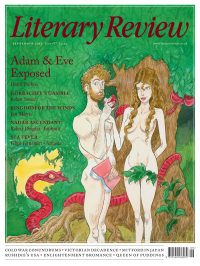John Sweeney
Aftershocks
Ghosts of the Tsunami
By Richard Lloyd Parry
Jonathan Cape 276pp £16.99
Roughly a year ago, I was fast asleep in bed in Perugia when the ground shook so violently I woke and vowed there and then to give up drinking. I drifted off back to troubled sleep. Twenty minutes later, the ground shook again and then I got it: I was living through an earthquake. Sixty miles away, in Amatrice and its environs, 299 people were killed. There is something horrible about an earthquake. It undermines your faith in the normal, the everyday, the notion that the earth is, to borrow a phrase, strong and stable. On the scientific level, you can read up on plate tectonics and learn all about the ongoing subduction of the Eurasian Plate beneath the Adriatic Plate and so on. But, at a human level, you fear that you are losing your grip on reality. That sense of mental dislocation – the idea that the floor beneath my feet might turn into a fizzing liquid – still troubles me. The day after the big quake there was an aftershock. I was sitting in a cafe when the whole building wobbled like jelly and people began to run, dementedly, away.
The 2011 earthquake in Japan triggered a tsunami with waves 120 feet high, shifted Japan’s main island a whole eight feet further east towards the United States, swamped a nuclear power station and killed more than 18,000 people. Richard Lloyd Parry’s extraordinary Ghosts of the Tsunami examines the mental dislocation

Sign Up to our newsletter
Receive free articles, highlights from the archive, news, details of prizes, and much more.@Lit_Review
Follow Literary Review on Twitter
Twitter Feed
Under its longest-serving editor, Graydon Carter, Vanity Fair was that rare thing – a New York society magazine that published serious journalism.
@PeterPeteryork looks at what Carter got right.
Peter York - Deluxe Editions
Peter York: Deluxe Editions - When the Going Was Good: An Editor’s Adventures During the Last Golden Age of Magazines by Graydon Carter
literaryreview.co.uk
Henry James returned to America in 1904 with three objectives: to see his brother William, to deliver a series of lectures on Balzac, and to gather material for a pair of books about modern America.
Peter Rose follows James out west.
Peter Rose - The Restless Analyst
Peter Rose: The Restless Analyst - Henry James Comes Home: Rediscovering America in the Gilded Age by Peter Brooks...
literaryreview.co.uk
Vladimir Putin served his apprenticeship in the KGB toward the end of the Cold War, a period during which Western societies were infiltrated by so-called 'illegals'.
Piers Brendon examines how the culture of Soviet spycraft shaped his thinking.
Piers Brendon - Tinker, Tailor, Sleeper, Troll
Piers Brendon: Tinker, Tailor, Sleeper, Troll - The Illegals: Russia’s Most Audacious Spies and the Plot to Infiltrate the West by Shaun Walker
literaryreview.co.uk